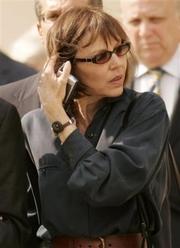
WASHINGTON - After nearly three months behind bars, New York Times reporter Judith Miller was released Thursday after agreeing to testify about the Bush administration's disclosure of a covert CIA officer's identity.
Miller left the federal detention center in Alexandria, Va., after reaching an agreement with Special Counsel Patrick Fitzgerald. She will appear Friday morning before a grand jury investigating the case.
"My source has now voluntarily and personally released me from my promise of confidentiality regarding our conversations," Miller said in a statement.
Her source was Vice President
Dick Cheney's chief of staff, I. Lewis "Scooter" Libby, reported the Times, which supported her contention that her source should be protected.
"As we have throughout this ordeal, we continue to support Judy Miller in the decision she has made," said Times publisher Arthur Sulzberger Jr. "We are very pleased that she has finally received a direct and uncoerced waiver, both by phone and in writing, releasing her from any claim of confidentiality and enabling her to testify."
Fitzgerald spokesman Randall Samborn declined to comment.
Until this past summer,
President Bush said leakers in the Plame probe would be fired. But in July after it was revealed that top aide Karl Rove and Libby had been involved in the leaks, Bush said "if someone committed a crime," he would be fired.
Miller has been in custody since July 6. A federal judge ordered her jailed when she refused to testify before the grand jury investigating the leak of CIA officer Valerie Plame's name by White House officials.
 |  |
The disclosure of Plame's identity by syndicated columnist Robert Novak in July 2003 triggered an inquiry that has caused political damage to the Bush White House and could still result in criminal charges against government officials.
The federal grand jury delving into the matter expires Oct. 28. Miller would have been freed at that time, but prosecutors could have pursued a criminal contempt of court charge against the reporter if she continued to defy Fitzgerald.
Of the reporters swept up in Fitzgerald's investigation, Miller is the only one to go to jail. She was found in civil contempt of court.
Time reporter Matthew Cooper testified to the grand jury after his magazine surrendered his notes and e-mail detailing a conversation with presidential aide Karl Rove.
Last year, Cooper and NBC's Tim Russert answered some of the prosecutor's questions about conversations they had with Libby.
Washington Post reporter Walter Pincus also answered the prosecutor's questions about a conversation with an unidentified administration official. Under the arrangements for his testimony, Pincus did not identify the official to the investigators, who already knew the official's identity. Prosecutors also say they know the identity of Miller's source.
Novak apparently has cooperated with prosecutors, though neither he nor his lawyer has said so.
Novak's column on July 14, 2003, came eight days after Plame's husband said in an opinion piece in the Times that the Bush administration twisted intelligence to exaggerate the threat from
Iraq's nuclear weapons program.
Novak wrote that two senior administration officials told him Plame had suggested sending her husband, former Ambassador Joseph Wilson, to the African nation of Niger on behalf of the CIA to look into possible Iraqi purchases of uranium yellowcake.
Wilson's article in the Times had stated it was highly doubtful that any such transaction had ever taken place.
 |  |
The timing of Wilson's article was devastating for the White House, which was struggling to fend off criticism because no weapons of mass destruction had been found in Iraq. The president's claims of such weapons in Iraq were the main justification for going to war.
According to an affidavit of Miller's in the investigation, the reporter spoke to one or more confidential sources regarding Wilson's op-ed piece, which was titled, "What I Didn't Find In Africa." She never wrote a story about Wilson or Plame.
Fitzgerald wanted Miller to tell the grand jury about the confidential conversations she had with a particular administration official and the prosecutor demanded that she produce documents relating to those conversations.
Fitzgerald said in July that he thought he had identified Miller's source and that the source had waived confidentiality.
Miller's cooperation could clear the way for Fitzgerald to wind up his investigation. Whether he will seek any indictments or is trying to negotiate guilty pleas with anyone isn't publicly known.
While the expiration of the grand jury on Oct. 28 would seem to be a milestone signifying the end of the investigation, Fitzgerald could ask the chief judge of the U.S. District Court for the District of Columbia, Thomas Hogan, to impanel a new grand jury.
Miller is a veteran national security reporter. In the 1980s, she became the first woman to be named chief of The Times' Cairo bureau in Egypt. For her work on
Osama bin Laden in 2001, she won a Pulitzer Prize for explanatory journalism as part of a small team of Times reporters.
Starting in 2002, her stories about weapons of mass destruction in Iraq helped bolster the Bush administration's case for toppling
Saddam Hussein. The failure to find the weapons prompted heavy criticism of Miller and the Times as well as of the Bush administration.
The news media is in a less-than-ideal position in the Plame probe.
The reporters' sources — rather than being whistle-blowers exposing wrongdoing and facing retaliation if identified — are government officials whose motives in leaking appear to have been to undermine the credibility of a critic of the Bush administration.
No comments:
Post a Comment